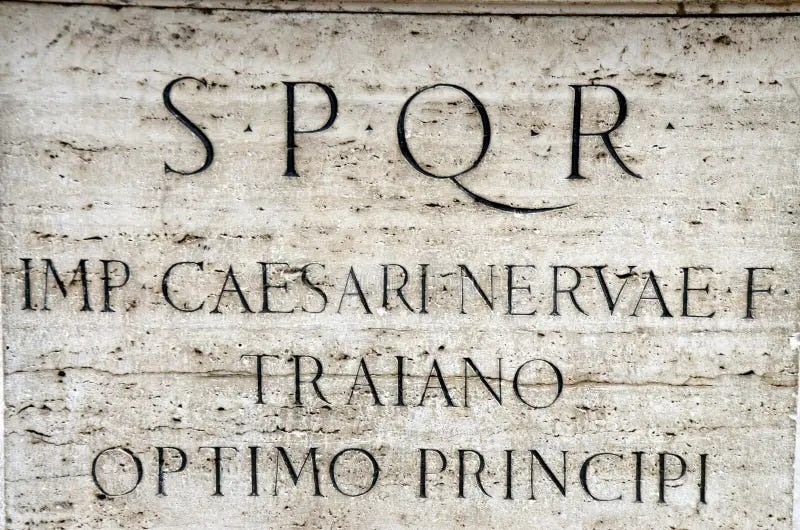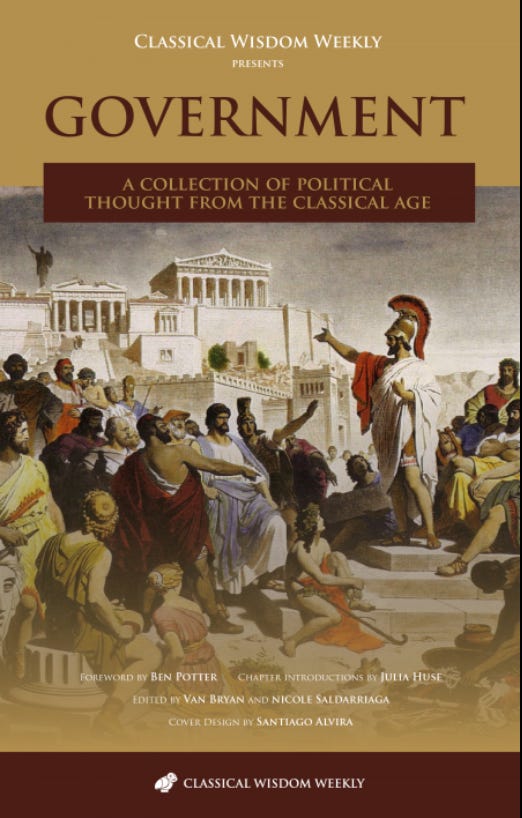Dear Classical Wisdom Reader,
The political philosopher Hannah Arendt astutely observed that the path to totalitarianism begins by unthinking. It is the use of stock phrases and empty slogans that motivate people to act without thoughtfully considering what they are saying and doing. If a motto is a ‘sufficient’ response, then reason goes out the window.
As such, as lovers of wisdom and pursuers of truth, we should always interrogate the words and terms that are thrown about in a constant and cavalier manner. “Question everything!” is the usual battlecry, particularly in momentous times. And yet, there are so many jingles and catchphrases, it’s hard to stop and investigate them all... so perhaps it’s best to consider their role in general.
Political slogans and mottos have existed since ancient times, of course, often used to rally support, convey ideals, or promote leaders. In ancient Greece, for example, phrases like "Freedom or Death" were used in various city-states to inspire citizens during conflicts. The Roman Republic, never to be outdone, also utilized slogans and phrases in political campaigns, such as "Senatus Populusque Romanus" (The Senate and the People of Rome) to emphasize the ‘unity’ between the government and its citizens.
These slogans served as powerful tools for persuasion, mobilization, and identity formation, similar to their use in modern political contexts...as propaganda. Before it got its negative spin (ironically), Propaganda was a word said loud and proud, more associated with the political sciences and public relations than the dark insidious meaning we think of today.
Yet, the “father of Public Relations” and author of Propaganda, spelled out not only its purpose in manipulation and misinformation, but also its integral role in democracy:
The conscious and intelligent manipulation of the organized habits and opinions of the masses is an important element in democratic society. Those who manipulate this unseen mechanism of society constitute an invisible government which is the true ruling power of our country. ...We are governed, our minds are molded, our tastes formed, our ideas suggested, largely by men we have never heard of. This is a logical result of the way in which our democratic society is organized.
-Eddie Bernays– Propaganda (1928) pp. 9–10
Whether it was a terrifying insight or a conspiratorial fear of Bernays, the impulse to shape and mold opinion is no doubt present throughout the ages and clearly in our here and now.
So today we ask you, dear reader, are propaganda and politics inevitable bedfellows? Does democracy amplify these tendencies? Is this good, bad or indifferent? And what -if anything- can be done about it?
As always you can write to me directly at anya@classicalwisdom.com or reply to this email.
Now, please enjoy our mailbag responses to “Do Individuals Move the Course of History?” below… full of history lessons and varied replies, there is plenty of fodder for thought as well!
All the Best,
Anya Leonard
Founder and Director
Classical Wisdom
P.S. Our society has long grappled with questions surrounding the role of government, the ideals of government, and, perhaps most importantly, our place as citizens within government. But these questions are far from new. The ancients were tangling with political thought for thousands of years before our modern political age.
So when investigating the evolution of government, and addressing important political questions, we can do no better than look towards our ancient forefathers. After all, it was in ancient Athens where democracy was first implemented.... and it was the ideals of the Roman Republic that inspired the American founding fathers.
Classical Wisdom Members: You can download your own Classical Wisdom anthology dedicated to Government, this Wednesday.
From voting for monarchy, the ideal state and Socrates and the social contract to Ostracism, tyranny and justice in a political state, discover for yourself the political thought of the ancient world…
Not a Member? Subscribe today to enjoy all of Classical Wisdom’s resources: Ebooks, Classical Wisdom Litterae Magazines and Podcasts with Professors.
Monday Mailbag
Re: “Do Individuals Move the Course of History?”
Hi Anya,
You obviously have some thinkers among your readers!!
The comments were as interesting as the article.
For myself, history is usually written or whitewashed by the victors but as a species who think it is the top of the evolutionary tree and continually want to reinvent the wheel, we ignore history at our peril.
Rhonda
-
Hi Anya--
Historical correction for one of your commentators: “. . .the taking the land of Indians.” North American Indians did not own land to be “taken” by anyone. They were nomads who moved around with the seasons, and their often-habitual camping-hunting areas had no borders. Burial grounds were sacred and generally respected—although also not “bordered”—and even respected by the American government treaties that “gave” tribes actual land “reservations.”
My thought: Philosophy, primitive as in religious or pragmatic (like today leading to inevitable collectivism) or intellectual-scientific/reality-oriented (like so many of the ancients), moves the course of history.
All best,
Alexandra
Let’s define our terms. “History” is not (though it could be) the story of the universe. That’s cosmology. It’s not even (though it could be) the story of our physiological evolution. That’s evolutionary biology. Rather, when we use the word “history,” we mean the story of our civilization, that culture and that society which humans have created and modified over time. And here, unless you are prepared to say that there is a disassociated third-party actor - be it God, the Absolute Spirit, Economics, etc - which lives outside our realm and moves us as unthinking pieces on chessboard (which you are perfectly entitled to say), then yes, the story of history is the story of humans: people making decisions and taking actions, which themselves are the effects of (or responses to) prior events, and which themselves then become the causes (in whole or in part) of the subsequent stage of human decisions and actions, and so on, in an endless (hopefully…) chain of events.
And from here I think we Hellenists have an advantage. Think of Ethics. We are not deontologists or utilitarians, champions of narrow philosophies grown in a lab which exist only in a hypothetical universe of specifically groomed circumstances. We operate instead through the flexible and adaptable frame of Virtue. Where there is certainly theory and there are certainly principles, but there is also a deep appreciation for the messiness and variability of situations. We do the same with history.
We read events, we read decisions and actions, we read causes and effects - all within their context. Some are most certainly predetermined, and inevitable. Others are highly dependent on facts and circumstances: weather, disease, and most certainly - other people. Are those people “great” or “world-historical”? I don’t think those questions are interesting. But are people impacted, and more importantly, impactful? You’d better believe it.
David J. W.
The article was wrong about there being no Jews in Northern Italy at the time. The first ghetto was established in Venice by 1516 and it's conveniently at the other (or opposite) side of the peninsula from Genoa. There had been rumors about this for over 50 years, so it's nothing new!
Elliot
-
I believe history makes individuals. When Esther hesitated to put her life at risk and visit Ahasuerus [Xerxes], her uncle Mordecai admonished her by saying if she kept quiet, relief and deliverance will come from elsewhere. History then is made in waves that rise and fall and the leader at the crest could just as easily been someone else and would have been someone else if the leader had not chosen to ride the wave and crest. When leaders decline to step forward they become victims of the next oncoming wave.
When they lead their success is catching the rising wave and rising it just as a surfer does the waves at Waikiki on a good wave day. Individuals do not act as tugboats. They are either on the ship or pulled along as jetsam afloat in the wake. Mordecai was right.
Charles F.
-
Columbus, the one that cut off the hands of those not bringing enough gold to him in the Americas.
Columbus, the one that filled the hold with as many slaves as he could carry back, (in the name of Christ?)
Great guy, that Columbus.
Never hear that about him, do we?
Bernard







I usually look at propaganda as being messaging crafted by the influence of the government Based upon that theory, there will always be a blending of politics in propaganda. If that theory is faulty, then there is no connection.
Regarding the effect of democracy on the issue: Democracy can make it either better or worse, because it implies that fresh blood is brought into the organization, which could (likely) change the organization itself, and possibly the message. The message could be either good or bad (to the public), but it can change when other influences are added into the mix..
"Bedfellows"? Absolutely as they often are tools. Propaganda in a democracy is not reserved to the ethical influencer generally good, bad or indifferent, but the persuasive political influencer. There is nothing that can be done about it, nor anything that should beyond self awareness and understanding propaganda to make critically evaluated and informed decisions. To believe or not believe.